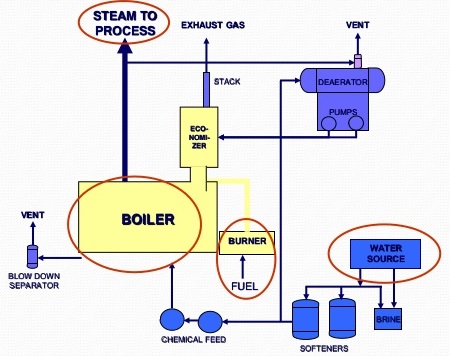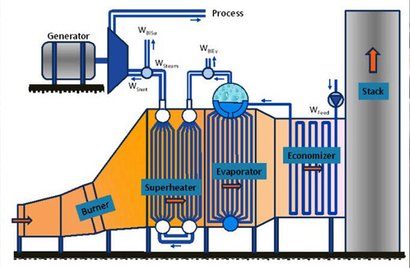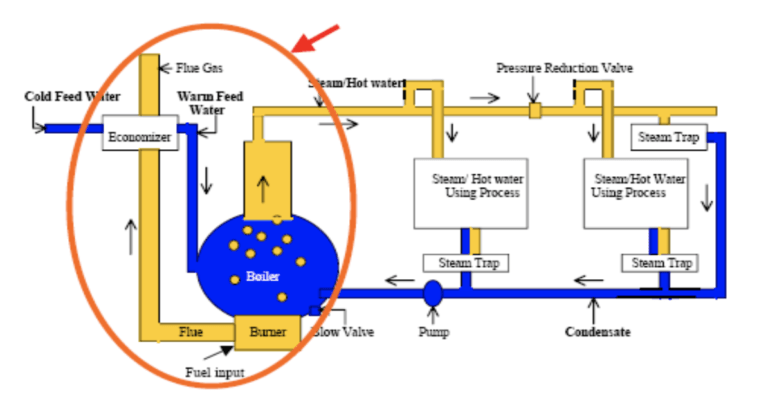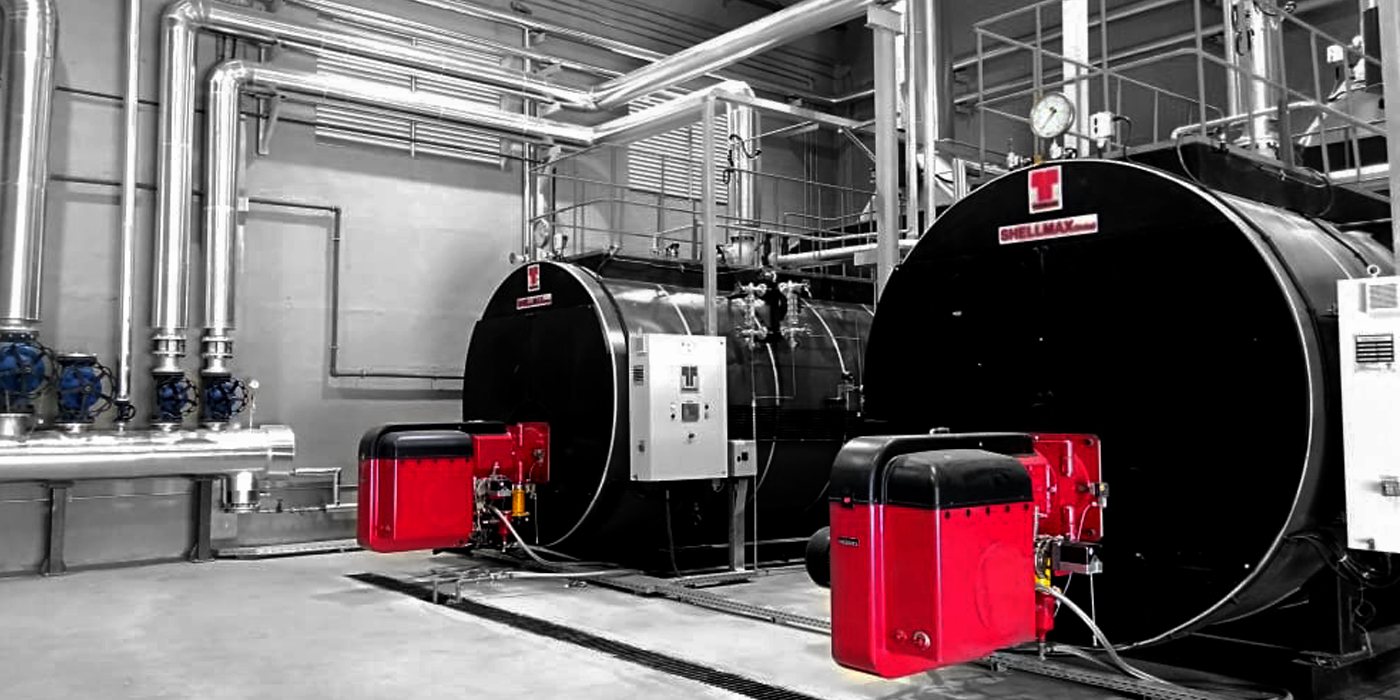Firstly, What is a Boiler?
Before we begin with all the uses of the boiler, let’s define what a boiler is and how it works.
A Boiler is a closed vessel in which water or other suitable liquid is heated to generate steam or vapour.The steam/vapour is then exited and is used for various purposes like heating applications (water heating, central heating), boiler based power generation or even for cooking and other purposes which could be domestic or industrial.
It basically follows the concept of a pressure cooker but in a bigger way. The boiler concept is used across places from domestic purposes to industrial activities. The fluid is generally incorporated into a system and it works to provide steam through connecting combustion products and the water.
There are many types of boilers based on their uses. While domestic boilers are small and are used for daily household chores, the industrial boilers today play a magnanimous role in the production process.
Industrial boilers can also be environment friendly if the fuel used is natural gas or other types of non-harming fuels. They not only deliver the desired performance but also help industries to keep a check on the toxic emissions that are harming the environment in the worst possible way.
For centuries we have been using boilers in various forms to heat water or to produce steam. Household boilers and Industrial boilers though have different purposes, but the operational aspect is similar. Good Industrial Boilers are known for their energy efficiency and massive heat production that has the capability of running your production processes. From steam-powered locomotives to external combustion engines to power plants, for various purposes, industrial boilers are used.
Heat is vital for life. Without it, we cannot sustain. From cooking to styling your hair, we need heat for almost everything. Our pressure cookers can explain the basic concept of steam boilers where steam is pressurised and used for cooking. Heat energy also reduces the reliance on fossil fuels like petrol, diesel and more.
Ever thought of enhancing your production efficiency without wasting money on electric energy? Did you know Industrial Boilers are powering many industries? Did you know Industrial Boilers are of various types and have different utilities? If not, here’s everything that you must understand about Industrial Boilers.
The importance of Industrial Boilers is not unknown to manufacturing companies. They use industrial boilers for their many advantages; one of them is saving the cost of using electric energy for the entire process. Electric power becomes extremely expensive if used on a large scale, but Industrial Boilers help in keeping the extra expense in check. Boilers offer maximum efficiency and minimum menace like fewer hassles of handling and depending on electric energy.

Basic Industrial Steam Boiler
In today’s time, efficient boiler technology is way more important than before. Heat energy will also improve equipment efficiency. Many industries are now using pressurised steam to run machines. It is not only efficient in enhancing your production but also is environment friendly in many ways.
First, it saves the companies from using gallons of electric energy which is expensive and harmful, according to an article published in 2015. Industries wasted three billion units of power. Imagine what the number for the amount of energy that was consumed would be! Appalling! Isn’t it? Here are the latest statistics of power consumption in 2020
The fuel used for the boilers is often natural gases and various other fossil fuels, coals and more. Thus, it is crucial to choose the right boiler that does not waste the heat produced, ensuring more delivery than other sources of energy.
Some of the best boiler manufacturers, Thermax, for example, offers waste heat recovery solutions as well. Thermax ensures that all the heat that usually is lost as exhaust gas is utilised to its maximum potential. Advance designs and constant innovations help in bringing out the best in the boilers.
Necessary Parts of an Industrial Boiler:

Parts of Industrial Boiler
Burner: The burner is the starter of the combustion reaction inside the boiler. There is a mechanism that sends the message to start the process of producing heat. A nozzle in the burner that turns the fuel pumped from the fuel source ignites it to create the combustion.
Combustion Chamber: The combustion chambers are made of cast iron and can have a temperature of several hundred degrees in minutes. It burns the fuel and generates heat which is transferred to the heat exchanger.
Heat Exchanger: Also called the economiser, it is responsible for increasing the efficiency of the boiler. The heat exchanger is placed before the air heater in the fuel gas path.
Steam Drum and Mud Drum: The steam drum collects the steam while the mud drum is placed beneath the steam drum and collects the solid which is removed periodically.
Fuel Sources used in boilers
From coal, kerosene to natural gases, the fuel can be of various types.
How does Industrial Boiler work?
Industrial Boilers are water-containing vessels that generate heat with the help of a fuel source. It is then transferred to various tubes connecting to the various industrial equipment. The steam energy is used for running the machinery, giving industries a cost-effective way of powering their production.

Basic Functioning of Industrial Boiler
The way the boilers work is not as complex one would think. It is a mix of basic science and the latest innovations. Separate parts of the system are placed at different points.
The heat source and the water vessels are placed in different compartments. The metal rods that connect to the water vessel and then the heat helps in steam production. The steam is then collected in a dome to condense it before releasing it from the boiler. This increases the pressure, and the energy produced helps in powering your production processes.
Often for safety purposes, boilers come with a safety valve to ensure zero mishaps because of the increased pressure. There are different types of boilers, depending on the purpose of use. We will get into the details of the classifications as we go further in the article.
Boiler Care For Longevity And Better Performance
Here are a few things that one should always take care of to increase the lifespan of boilers.
- General safety checks at regular intervals are crucial for maintaining the boilers.
- Boiler temperature should be perfect as overheating can be a cause of the boiler’s breakdown.
- Avoid inefficiency by keeping a tab on the fuel levels, circulations and pressure.
- A boiler should always have smoke detectors and alarms for low fuel and pressure for safer functioning.
- The Chimneys, vents and outlets must be cleaned for better productivity of the boilers.


